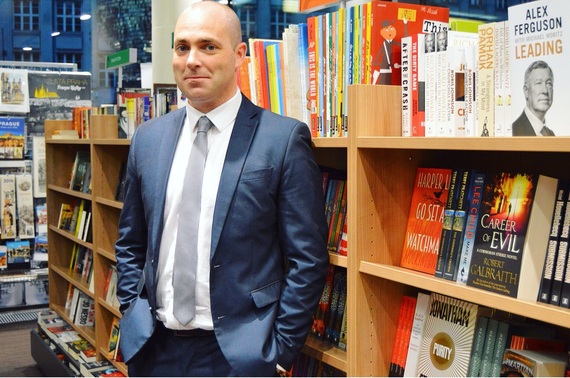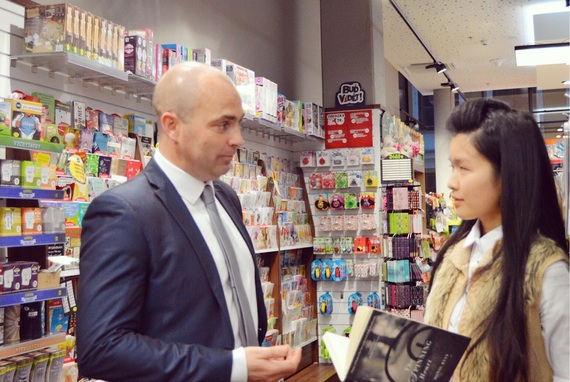Donal Ryan is a mutli-award winning Irish novelist. His debut novel,''The Spinning Heart'', rejected 47 different times by publishers, won the Book of the Year at the Irish Book Awards, the Guardian First Book Award, the European Union Prize for Literature, and was one of a dozen of books chosen for the longlist of the Man Booker Prize. It seems that sometimes being rejected is the best thing that can happen to you in life and you should never let rejection stop you from achieving your goals. Lan Anh Vu sat down with Ryan to learn more about his journey and how he handles rejections.
- As told to Lan Anh Vu
Writing has been a passion for me since early childhood
My passion for writing has always been there, but I tended to push it to the back of my mind for years. It was there from my early childhood; the things you can do with language were there in my consciousness. I started novel after novel: normally I would write ten pages, and then I would burn the manuscript. I started a number of novels in my twenties, and re-reading them in my thirties was actually embarrassing. The work was readable, but still I felt a kind of embarrassment over everything I wrote. The shame has stuck with me for some reasons, I am not sure why. But it never really worked out.
Having children gave me the motivation I needed to finish two novels
I started to write The Thing about December when my wife was pregnant with our first child. I thought to myself, if I don't finish a novel, I'll be someone who said he would write another novel and didn't do it. The fact that, I was going to be a father gave me a push; it gave me the desire to be a good example. If I could not get my work published, at least I could say I finished something that I said I would do for years, and I wouldn't just be somebody who said he would do it. My wife kept me going, and she liked the character of Johnsey Cunliffe so much that it gave me the push to keep writing. The book meant a lot to her. It seemed to me that I had to get out of my system. Even if it didn't get published, I want to have one thing in the world that I could be proud of, that I could say I created and that I wasn't ashamed of.
My books were rejected 47 times before finally being published
When I submitted The Thing about December and Spinning Heart, I sent them everywhere. I used the old scatter-gun approach, and wrote to a total of 48 publishers and agents. I sent out manuscripts every week, because if you send things out one by one, agents and publishers will take years to get back to you. I received 47 rejections spread across three years. I was patronizing about the first few rejections, thinking things like, ''Who do they think they are rejecting me?". I think I did a decent job of not taking rejection too personally. But every rejection does hurt a little bit. It knocks you down a little bit. I found it so hard to believe in the work I was doing and to see that there was merit to what I was trying to achieve. The smallest negative thought can have a profound effect on your dreams.
If your book hasn't been on commission and you have no record or history in publishing, it can be very difficult. It is harder to get agents than publishers now, so you are in turn of rejections, if you are completely alone. I heard that writers would sometimes get very long, considered rejections. But I wasn't getting responses like that. All of my rejections were short and perfunctory, probably two sentences long. The rejections normally followed the same format that the submissions were made in, and were always firm replies. I knew that my manuscript wasn't being read, and so I became determined to get a considered response. I thought, "If I get one in-depth response, something that the reader really thought about and that could give me some feedback that would be constructive." So it became a question of persistence over receiving some kind of reaction from somebody. I don't blame publishers or agents, because it is hard to get through the slush pile. But my wife told me to keep trying, because she knew the only thing that would make me happy would be if I fulfilled this crazy dream to be a writer.
How my books got published
The Thing about December was the manuscript I sent to Antony Farrell. Sarah Davis-Goff, who worked at Lilliput Press at the time, happened upon it in a pile of submissions in their reading room. She showed it to her colleague Daniel Caffrey. Eventually he agreed to meet me, and Daniel called and invited me to Stoneybatter. I had just finished Spinning Heart at this stage, and had been galvanized by Brian Langan's assessment of it, and so I brought it with me. Antony called me a few days after that meeting and formally offered to publish both novels.
My writing process
To be honest, my writing process doesn't look attractive. I typically have to think for a while before I start. Then I switch from thinking to actually writing. For years every sentence I wrote just didn't ring true, so I would just cross it out and start again. For many years this was what prevented my output. I would start writing a story and then questioned myself. I always felt there had to be a better way of to say something. My trust in myself was so hard to find. It took me few years to realize that there are roughly a million words in the English language. There's a number somewhere on the theoretical level that expresses the number of possible ways those words can be combined. But we mortals might as well say there's an infinite number of ways to say anything. So there is no perfect sentence. Perfection exists only as a fleeting sense of something, an ephemeral impression, a feeling in your gut. You can never be completely happy with anything you write.
The most exciting challenges and possibilities at the moment for writers
I think writers are sometimes afraid to honor obligation to describe the world as it is and to answer questions about life, because all you can really do is describe life and hopefully in that process test illuminate in some aspects of humanity in whatever weak way. I think telling a story as truthfully and beautifully as possible is a challenge for all writers, because all humans want to be told stories. We all communicate stories constantly. You can't allow yourself to be self indulgent. You must keep part of your mind focused on your reader. The art of writing is intensely personal. You create your art in a solitary environment, and then you put it out into a world where you have no control over how it is interpreted, understood, or received. It is so easy for your confidence to just disappear. So you have to focus part of your mind as a writer and a person on, who might read your work. When you create any kind of art, you issue a contract, though you can't decide and dictate its terms, because people who might observe or read your work will do it on their own terms and you have no control over that. So you have to step back from the temptations of opacity and make something that can actually be properly understood.
What I have learned
If I could do it over again, I wouldn't spend ten years writing and re-writing every single sentence. I would get someone I trust, someone I knew would be a good reader, and have them read my work. My wife gives a pure read; she is a natural and excellent editor. She has an eye for everything. I love to see her reaction when she likes what she is reading.
Advice for young people out there who would like to follow in my footsteps as a writer
It sounds like very simple advice, but to be a writer, you have to read first, and then you have to write. It might seem really obvious, but it's a piece of advice people seldom take. People often say they want to be a writer, but then they never write. You need to be strict and disciplined with yourself. You have to write a story that is readable; make it as truthful and as beautiful as you can. Keep it simple. You have to forget about the competition, forget every other writer exists, because we exist in an ocean of writers, and the only voice that matters is yours. You have to find your own voice and stick to it.
This interview has been condensed and edited for clarity.


